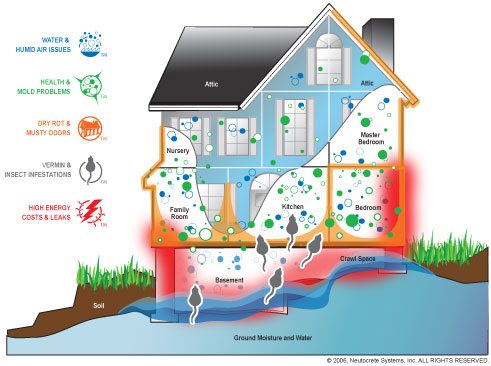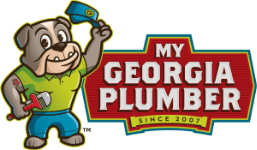
Suffice it to say that basements are subject to an incredible amount of pressure, including a surprising amount of hydrostatic pressure from groundwater. It makes sense that during the rainy season, basements are extremely vulnerable to seepage and leaks.
Still, it can be concerning to find a puddle of water below your home. It’s even more concerning to think you have a leaking basement, but you don’t know what the exact source is. In general, a dank smell and the presence of mold and mildew are signs of water leaking into a basement. But if finding the culprit isn’t so simple, this guide on how to find a source of the water leak in your basement may be able to help.
Cracks
Cracks are some of the most obvious signs of water leaking into a basement wall. Essentially, improperly sealed concrete is porous, so capillary action causes it to absorb groundwater. That, combined with the hydrostatic pressure from the groundwater outside, starts to wear down on the integrity of the basement walls.
Pipe Leaks
Pipes with cracks and blockages are common sources of moisture in basements. Proper insulation is key to preventing your pipes from bursting, but regular inspections can also catch any leaks, cracks, and blockages in your pipes.
Leaking Windows
Improperly sealed and caulked windows can lead to a leaky basement. After some rain, look for leaks by the windows. If it isn’t properly sealed, you can fix it by replacing the caulk.
Efflorescence
Not to be confused with mold, efflorescence is a white, powdery substance that appears on the walls. It’s actually residual mineral salt from the groundwater outside, since most water contains minerals. It’s harmless, but it is unsightly and may lead to the development of mold.
Water Stains
If you’re seeing red, rusty stains on the wall, then it’s a sign that water is seeping in from outside. The color comes from iron ochre, a mineral that comes from underground.
Groundwater Around Foundation
Groundwater can seep into the foundation, which then lets water into the basement’s porous concrete. In that case, check that the ground around the foundation hasn’t dipped, forming a moat around the house that leaks water into the foundation walls and basement. Because it’s one of the most effective preventative measures against a leaking basement, it’s one of the reasons that people recommend sloping the ground around a building’s foundation.
Step 1: Check for moisture. If you are noticing moisture in your basement, there’s a good sign that it is leaking. Most moisture will come from cracks where your basement wall meets the floor (the cove area). If you notice any moisture coming from cracks in basement walls or floors, your basement has a leak. If not properly dealt with, these cracks can jeopardize the strength of your home’s foundation.
Step 2: Check for mold. Two signs that you have mold include a musty smell and/or small black and white specks on your wall. If you find that mold is present in your basement the best thing to do is clean the area with warm soapy water, then with a solution of ¼ cup bleach mixed with 1 gallon of water, then dry. Vacuum, wash, and remove any exposed material to get rid of spores. DO NOT paint or caulk over mold. The mold will simply grow underneath the paint and it will peel off of your walls.







